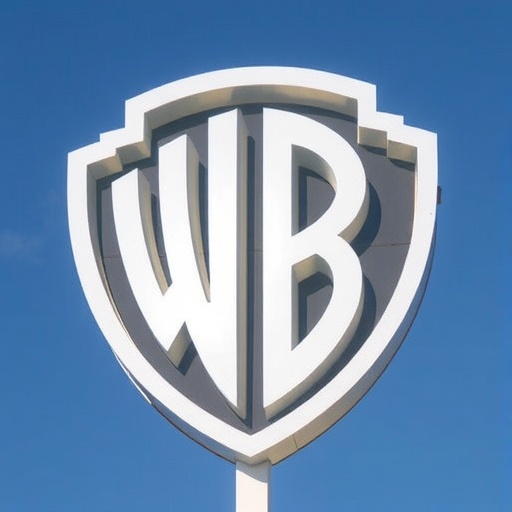Warner Bros. Explores Sale Options as Unsolicited Bids Trigger Dramatic Stock Surge
In a stunning turn of events that’s sending shockwaves through Hollywood, Warner Bros. Discovery has confirmed it’s evaluating potential sale opportunities following a barrage of unsolicited interest from major players in the entertainment and investment worlds. The news, which broke late yesterday, has propelled the company’s stock into overdrive, with shares surging more than 22% in after-hours trading alone, marking one of the most volatile days for the media giant in recent years.
- Unsolicited Bids Pour In, Sparking Warner Bros. Boardroom Buzz
- Stock Surge Fuels Investor Frenzy Around Warner Bros. Valuation
- Potential Acquirers Eye Warner Bros. Crown Jewels
- Warner Bros. Leadership Grapples with Sale’s Double-Edged Sword
- Future Horizons: How a Warner Bros. Sale Could Reshape Hollywood
This development comes at a pivotal moment for Warner Bros., a cornerstone of the global entertainment industry long synonymous with blockbuster films, iconic TV shows, and pioneering streaming services. As whispers of acquisition talks grow louder, investors are buzzing with speculation about who might swoop in to reshape the future of content creation. The stock surge not only reflects market optimism but also underscores the high stakes involved in any potential Warner Bros. sale.
Unsolicited Bids Pour In, Sparking Warner Bros. Boardroom Buzz
The catalyst for this frenzy was a quiet but insistent wave of unsolicited bids that began reaching Warner Bros. Discovery’s executive suite just weeks ago. Sources close to the matter, speaking on condition of anonymity, reveal that at least three high-profile entities—ranging from private equity firms to rival media conglomerates—have expressed formal interest in acquiring the company or significant stakes in it. While the identities remain under wraps to comply with non-disclosure agreements, industry insiders point to players like Apollo Global Management, a private equity behemoth with a history of media investments, and even tech giants eyeing expansion into traditional Hollywood assets.
Warner Bros. Discovery, formed in 2022 from the merger of WarnerMedia and Discovery Inc., has been navigating turbulent waters. The company reported a net loss of $9.1 billion in 2022, largely due to write-downs on its streaming assets and underperforming linear TV networks. However, recent quarters have shown glimmers of recovery: Q2 2023 earnings beat expectations with $10.4 billion in revenue, driven by hits like “Barbie” and the ongoing success of HBO Max (now Max). This unsolicited interest arrives as Warner Bros. stock had been languishing around $10 per share, down over 50% from its merger highs.
“We’re always open to exploring value-creating opportunities that benefit our shareholders,” a Warner Bros. spokesperson stated in an official release. “These discussions are preliminary, but they highlight the strong underlying value of our unparalleled content library and global reach.” The spokesperson emphasized that no formal sale process has been initiated, but the board is actively reviewing strategic alternatives, including a full sale, mergers, or even spinning off divisions like the storied Warner Bros. Pictures studio.
To put this in perspective, Warner Bros. boasts a library of over 100,000 hours of content, including franchises like DC Comics, Harry Potter, and Looney Tunes. Any sale could value the company at upwards of $30 billion, based on current market multiples for media firms. Analysts at JPMorgan Chase noted in a research note that the unsolicited bids could accelerate a much-needed recapitalization, especially as the company carries $41 billion in debt from the merger.
Stock Surge Fuels Investor Frenzy Around Warner Bros. Valuation
The market’s reaction was swift and ferocious. Warner Bros. Discovery’s stock (NASDAQ: WBD) closed at $11.05 on Thursday, up 8% for the day, but exploded in after-hours trading to hit $13.50—a stock surge of 22% that added nearly $5 billion to the company’s market capitalization in hours. Trading volume spiked to 150 million shares, triple the average, as hedge funds and retail investors piled in, betting on a premium buyout.
This isn’t just hype; it’s rooted in tangible momentum. Over the past year, Warner Bros. shares had shed value amid broader media sector woes, including cord-cutting and the rise of ad-supported streaming. Yet, the stock surge mirrors patterns seen in past media deals, like the 2019 acquisition of 21st Century Fox by Disney, which saw Fox shares jump 20% on announcement. “The market is pricing in a 40-50% premium on current levels if a sale materializes,” said Wedbush Securities analyst Daniel Ives in an interview. “Warner Bros. is a sleeping giant with IP that’s gold in the streaming era.”
Breaking down the numbers: Warner Bros. Discovery’s enterprise value stands at approximately $55 billion, factoring in debt. A sale at even a modest premium could yield $20-25 per share for investors, a windfall from today’s levels. Retail platforms like Robinhood reported Warner Bros. as one of the top-traded stocks Friday morning, with social media sentiment scores on StockTwits reaching “extremely bullish” territory.
Historical context adds depth: Warner Bros. has weathered sales rumors before, notably in 2019 when AT&T (pre-merger) considered divesting assets. But this time, the unsolicited nature of the bids suggests external pressure for change, possibly from activist investors like Vanguard Group, which holds a 9% stake and has pushed for cost-cutting.
- Pre-surge low: $8.50 in May 2023
- Post-surge high: $13.75 intraday Friday
- Year-to-date gain: Now up 25% YTD, reversing earlier losses
- Comparable deals: Paramount Global’s ongoing sale talks valued at $16 billion
Economists warn that while the stock surge is exhilarating, it could lead to volatility if talks fizzle. “Short-term pops like this often precede consolidation, but Warner Bros.’ debt load makes a clean sale tricky,” noted Forbes contributor Eric Jackson.
Potential Acquirers Eye Warner Bros. Crown Jewels
Who might be behind these mystery bids? Speculation is rife, with names floating from Silicon Valley to Wall Street. Tech behemoths like Amazon and Netflix are perennial suspects; Amazon, already owning MGM, could integrate Warner’s vast library to bolster Prime Video, which commands 200 million subscribers. A Warner Bros. sale to Amazon might create a content powerhouse rivaling Disney+, especially with synergies in sports rights—Warner holds NBA and NHL packages.
Private equity is another hot contender. Firms like Blackstone or KKR, flush with dry powder from unspent funds totaling $1.2 trillion industry-wide, see Warner Bros. as a turnaround play. “The sale could involve carving out streaming from studios, selling the former to PE while keeping the latter for a media partner,” suggested Morningstar analyst Paul Swinand. Sony Pictures, fresh off Spider-Man successes, might bid for Warner’s effects-heavy divisions to fuel its own franchises.
International interest is also bubbling. Saudi Arabia’s Public Investment Fund (PIF), which has poured billions into live events via LIV Golf and Newcastle United, could view Warner Bros. as a gateway to global entertainment. PIF’s $500 million stake in Lucid Motors shows their appetite for high-profile assets. Meanwhile, Elon Musk’s xAI or even Elon Musk himself has tweeted vaguely about media consolidation, though that’s pure conjecture.
Quotes from the trenches: Warner Bros. CEO David Zaslav, in a recent earnings call, hinted at openness to deals: “We’re focused on maximizing shareholder value in a dynamic landscape.” On the buyer side, an Apollo spokesperson declined comment but noted the firm’s $40 billion media portfolio includes Yahoo and AOL—echoes of Warner’s digital past.
Regulatory hurdles loom large. A Warner Bros. sale to a Big Tech firm would invite antitrust scrutiny from the FTC, especially post-Microsoft-Activision. The DOJ’s recent block of JetBlue-Spirit merger sets a tough precedent. Still, with streaming market share fragmented—Disney at 20%, Netflix at 18%, Warner at 12%—a deal could pass if it doesn’t create a monopoly.
- Amazon: Synergies with AWS for content delivery; potential $40B bid
- Private Equity Consortium: Breakup strategy, valuing studios at $15B separately
- Sony/Paramount Tie-Up: Horizontal merger to counter streaming giants
- International Funds: PIF or SoftBank for global expansion
Warner Bros. Leadership Grapples with Sale’s Double-Edged Sword
Inside Warner Bros. headquarters in Burbank, California, the mood is a mix of excitement and caution. Leadership, led by Zaslav, faces a delicate balancing act: a sale could provide liquidity to pay down debt and invest in hits, but it risks diluting the company’s creative independence. Zaslav, who steered the Discovery merger, has a track record of bold moves, including shelving $90 million film “Batgirl” to cut costs—a decision still echoing in Hollywood.
Employee sentiment is mixed. The Writers Guild strike’s recent end brought relief, but a sale could mean layoffs or cultural shifts. “We’ve built Warner into a legacy brand; selling feels like handing over the family silver,” said one veteran producer, speaking anonymously. On the flip side, the stock surge has padded 401(k)s for many of the 40,000 employees.
Financially, the math adds up for action. Warner’s free cash flow hit $2.5 billion in 2023, but interest payments on debt eat 20% of EBITDA. A sale or recap could refinance at lower rates amid cooling inflation. Credit rating agencies like Moody’s upgraded Warner to B2 from B3 last month, citing improved liquidity— a green light for dealmakers.
Broader context: The media landscape is in flux. Traditional studios like Warner Bros. are pivoting to IP-driven content amid declining theatrical revenues (down 15% YoY). Hits like “The Last of Us” on Max show streaming’s promise, with subscribers up 10% to 97 million. Yet, competition from TikTok and YouTube shorts erodes ad dollars, pressuring legacy players toward consolidation.
Experts like PwC’s media outlook predict 5-7 major deals in 2024, with Warner Bros. as a prime candidate. “This sale exploration isn’t panic—it’s proactive in a consolidating industry,” said Deloitte’s media analyst Julia Alexander.
Future Horizons: How a Warner Bros. Sale Could Reshape Hollywood
Looking ahead, a Warner Bros. sale could be the domino that topples others. If consummated, it might trigger bids for Paramount or even MGM, accelerating a wave of mergers that redefine content distribution. Imagine a post-sale Warner under Amazon: AI-enhanced production via AWS, personalized recommendations powered by Alexa, and bundled services with Whole Foods perks— a consumer ecosystem dream.
For shareholders, the stock surge suggests more upside; analysts project $18-22 targets if bids firm up. Warner Bros. plans to update on strategic reviews during its Q3 earnings in November, potentially unveiling a formal auction process. In the interim, expect more leaks and board meetings, as the clock ticks on these unsolicited overtures.
The entertainment world watches breathlessly. A sale isn’t just financial—it’s about who controls the stories that shape culture. From superhero epics to prestige dramas, Warner Bros.’ fate could herald a new era where tech and tradition collide, promising innovation but also uncertainty for creators and audiences alike.
Stay tuned as this saga unfolds; Warner Bros. remains the beating heart of Hollywood, and its next chapter could be its most blockbuster yet.








